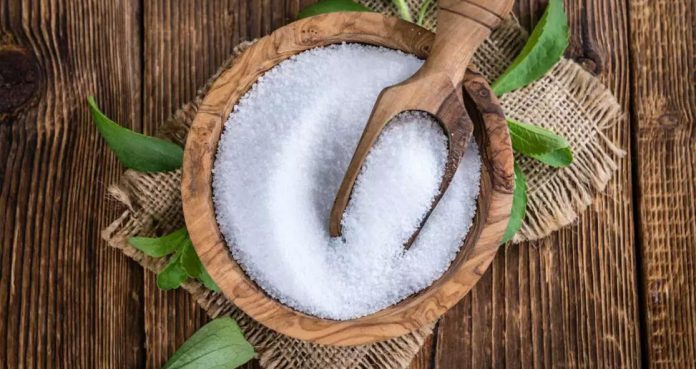We often prefer or food and beverage to be as natural and organic as possible, and there is no exception when it comes to low- and no-calorie sweeteners.
The sales of stevia sweetener, which is led by Truvia Natural Sweetener, have dominated the sales of artificial sweeteners such as sucralose, saccharin, and aspartame. Last August, it was found that stevia sales had grown by 11 percent, while artificial sweetener sales went down to 6 percent. Another popular non-nutritive natural sweetener is monk fruit and its sales went up to 20 percent.
So, it is no wonder that the popularity of natural sugar-free sweeteners has increased.
Americans are the top sugar consumers in the world. Yet, we are aware of the fact that too much sugar consumption can lead to obesity, heart disease, diabetes, and fatty liver disease.
Stevia leaves are used as a natural sweetener since the 16th century. However, its extract has been approved for use in foods in the United States since 2008.
It is more than 200 times as sweet as sugar, so you only need a very small amount to sweeten your foods and beverages. Plus, it is very low enough in calories, which is also known as a “zero calorie” sweetener.
One of the drawbacks is that some compounds in stevia, especially steviosides, have a bitter aftertaste.
Truvia is one of the top-selling stevia brands in the United States. It has zero calories and is sugarless.
When compared with other sweeteners, stevia has been considered safe for use by the general population, including children. The Acceptable Daily Intake (ADI) is set at 4 mg per kg of body weight. So, according to the FDA, you can have up to 273 mg of stevia if you weigh 150 pounds.
Moreover, animal studies have suggested that stevia extracts are nontoxic.
Researchers have also found that stevia does not raise blood sugar and does not cause cavities the way artificial sugars do. In fact, they found that stevia may help reduce insulin levels compared to artificial sweeteners.
On the other hand, monk fruit sweetener contains little carbs and zero sugar, so it does not increase your blood sugar levels. Generally, the FDA generally recognizes Monk fruit as safe; however, there is no ADI limit to it.
Both stevia and monk fruit are safe, but do they help people lose weight? There is no evidence to support the idea that these low-calorie natural sweeteners promote weight loss.
You must also look for other ingredients in your sweeteners such as erythritol, cellulose, and inulin. Dextrose, lactose and maltodextrin are a few less desirable additions.
Erythritol, aka sugar alcohol, is naturally found in mushrooms, grapes, and beer. It has 0.24 calories per gram, and yet it is 70 percent as sweet as sugar. Erythritol also helps fight cavities. It has a minimal impact on blood sugar and does not seem to affect intestinal bacterial flora. Animal studies have found that it is safe.
Stevia and monk fruit are certainly natural, but their extracts may have been processed and refined. Please note that natural does not necessarily mean better. For instance, whole stevia leaves and crude extracts are not approved for use in food as they are related to kidney health issues.























